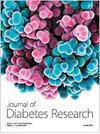Lactiplantibacillus plantarum NKK20 Increases Intestinal Butyrate Production and Inhibits Type 2 Diabetic Kidney Injury through PI3K/Akt Pathway
IF 3.6
3区 医学
Q2 ENDOCRINOLOGY & METABOLISM
引用次数: 0
Abstract
Nephropathy injury is a prevalent complication observed in individuals with diabetes, serving as a prominent contributor to end-stage renal disease, and the advanced glycation products (AGEs) are important factors that induce kidney injury in patients with diabetes. Addressing this condition remains a challenging aspect in clinical practice. The aim of this study was to explore the effects of Lactiplantibacillus plantarum NKK20 strain (NKK20) which protects against diabetic kidney disease (DKD) based on animal and cell models. The results showed that the NKK20 can significantly reduce renal inflammatory response, serum oxidative stress response, and AGE concentration in diabetic mice. After treatment with NKK20, the kidney damage of diabetic mice was significantly improved, and more importantly, the concentration of butyrate, a specific anti-inflammatory metabolite of intestinal flora in the stool of diabetic mice, was significantly increased. In addition, nontargeted metabolomics analysis showed a significant difference between the metabolites in the mouse serum contents of the NKK20 administration group and those in the nephropathy injury group, in which a total of 24 different metabolites that were significantly affected by NKK20 were observed, and these metabolites were mainly involved in glycerophospholipid metabolism and arachidonic acid metabolism. Also, the administration of butyrate to human kidney- (HK-) 2 cells that were stimulated by AGEs resulted in a significant upregulation of ZO-1, Occludin, and E-cadherin gene expressions and downregulation of α-SMA gene expression. This means that butyrate can maintain the tight junction structure of HK-2 cells and inhibit fibrosis. Butyrate also significantly inhibited the activation of PI3K/Akt pathway. These results indicate that NKK20 can treat kidney injury in diabetic mice by reducing blood glucose and AGE concentration and increasing butyrate production in the intestine. By inhibiting PI3K pathway activation in HK-2 cells, butyrate maintains a tight junction structure of renal tubule epithelial cells and inhibits renal tissue fibrosis. These results suggest that NKK20 is helpful to prevent and treat the occurrence and aggravation of diabetic kidney injury.植物乳杆菌 NKK20 通过 PI3K/Akt 通路增加肠道丁酸盐生成并抑制 2 型糖尿病肾损伤
肾病损伤是糖尿病患者常见的并发症,是终末期肾病的主要诱因,而高级糖化产物(AGEs)是诱发糖尿病患者肾损伤的重要因素。在临床实践中,解决这一问题仍是一个具有挑战性的方面。本研究旨在基于动物和细胞模型,探讨植物乳杆菌 NKK20 菌株(NKK20)对糖尿病肾病(DKD)的保护作用。结果表明,NKK20 能显著降低糖尿病小鼠的肾脏炎症反应、血清氧化应激反应和 AGE 浓度。经 NKK20 治疗后,糖尿病小鼠的肾脏损伤明显改善,更重要的是,糖尿病小鼠粪便中肠道菌群特异性抗炎代谢产物丁酸盐的浓度明显增加。此外,非靶向代谢组学分析表明,NKK20给药组与肾病损伤组小鼠血清中的代谢物含量存在显著差异,其中受NKK20显著影响的代谢物共有24种,这些代谢物主要参与甘油磷脂代谢和花生四烯酸代谢。此外,给受到 AGEs 刺激的人肾-(HK-)2 细胞注射丁酸盐后,ZO-1、Occludin 和 E-cadherin 基因表达明显上调,α-SMA 基因表达下调。这说明丁酸盐能维持HK-2细胞的紧密连接结构,抑制纤维化。丁酸盐还能明显抑制 PI3K/Akt 通路的激活。这些结果表明,NKK20 可通过降低血糖和 AGE 浓度以及增加肠道中丁酸盐的产生来治疗糖尿病小鼠的肾损伤。通过抑制 HK-2 细胞中 PI3K 通路的激活,丁酸盐可维持肾小管上皮细胞的紧密连接结构,抑制肾组织纤维化。这些结果表明,NKK20 有助于预防和治疗糖尿病肾损伤的发生和加重。
本文章由计算机程序翻译,如有差异,请以英文原文为准。
求助全文
约1分钟内获得全文
求助全文
来源期刊

Journal of Diabetes Research
ENDOCRINOLOGY & METABOLISM-MEDICINE, RESEARCH & EXPERIMENTAL
CiteScore
8.40
自引率
2.30%
发文量
152
审稿时长
14 weeks
期刊介绍:
Journal of Diabetes Research is a peer-reviewed, Open Access journal that publishes research articles, review articles, and clinical studies related to type 1 and type 2 diabetes. The journal welcomes submissions focusing on the epidemiology, etiology, pathogenesis, management, and prevention of diabetes, as well as associated complications, such as diabetic retinopathy, neuropathy and nephropathy.
 求助内容:
求助内容: 应助结果提醒方式:
应助结果提醒方式:


